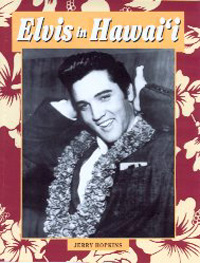Jerry Hopkins wrote the first serious biography of Elvis Presley, Elvis, published in 1972, followed by Elvis: The Final Years in 1981. Now a resident of Thailand, he writes more about food and travel than music but has just published another Elvis book, Elvis In Hawai'i. "However trivial the idea 'Elvis In Hawai'i' may sound to a non-Elvis fan, to an Elvis fan it makes sense he said. "And to people in Hawaii it makes sense. Because there was a relationship between Elvis and the islands that was, and continues to be, very important."
Goldmine: How did your first Elvis biography come about?
I was doing a Rolling Stone interview with Jim Morrison. I'd written a small history of rock 'n' roll, and Jim had read it and wondered if I was working on another. I said I was thinking about doing a biography - I thought Frank Zappa would he a good subject. And Jim said, "I'd like to read a book about Elvis." That planted the seed.
That made it natural to do a second book.
Yes. Shortly before Elvis died, the "bodyguard book" came out [Elvis: What Happened?]. And after his death there were a lot of books that focused on the drugs, the women, the guns and all of that. I felt that however true a lot of those stories were, it was all out of proportion to the truth - it was being forgotten that the man was a good singer and that he represented something historically that was hugely significant. So I wanted to do a companion book, to finish the story.
You had some interesting interactions with Col. Tom Parker.
I'd asked for interviews when I was doing the first book, and Parker said no. I think he regarded it easier to say no to everyone than decide who he was going to say yes to. After Elvis died, when I was doing a 13th hour for the radio program [Hopkins had previously done a 12-hour radio show on Presley],I got a phone call and it was the Colonel! And he said, "Mr. Hopkins?," chatted for a moment, and then said, "We just gotta keep one thing clear here. We're both in this for the almighty dollar. You keep that in mind, and we'll get along just fine." And when I decided to do the second book, I got another call from a friend who was RCA's assigned person to the Colonel. He said, "The Colonel would like you to join us for coffee. There are some ground rules: You can't ask questions, you can't take notes, and you can't bring a tape recorder." I said, "No problem." So I went to RCA and had coffee and donuts with the Colonel. He just expounded for a couple of hours, and at the end he said, "If you need any help in your research, if somebody won't talk to you, drop my name." And I said, "Great, thank you." I was, however, determined not to drop his name. I didn't want to put myself in a position where anybody could say I was biased in some way. But when I went to Vegas to do research, the people at the hotel where Elvis performed [the Hilton International] just threw up a wall. So I said, "Well, the Colonel said I could tell you to call him if there were any questions." And the hotel person said, "You don't mind if I check that with the Colonel, do you?" I said, "Go ahead." And 20 minutes later my phone rang and it was the guy from the hotel and he said, "When do you want to come and who do you want to talk to?" So I guess the Colonel enjoyed the first book - though he never said so.
What gave you the idea to do a book on Elvis in Hawaii?
Elvis was, to my knowledge anyway, the only non-Hawaiian performer who actually physically performed there in the 1950s, the 1960s and the 1970s. I saw it as a softcover book with a lot of pictures and not a lot of text. I initially abandoned the book [in 1993] because I moved to Asia. Then in December 2001, when I was back in Hawaii, I met with my publisher and he said, "Would you be interested in picking up where you left off?"
What makes this book especially interesting to you?
I tried to find visual material which had not been seen before. I went to a local gossip columnist and asked him to put an item in his column saying I was looking for photographs of Elvis local residents might have taken and uncovered some wonderful stuff. And that provided a more personal, close-up look at Elvis. both visually and in the text. That sort of stuff is, I think, what makes the hook stand out.
Interview With Jerry Hopkins, Author Of Elvis In Hawai'i
By Gillian G. Gaar (Goldmine), February 05, 2003 | Book